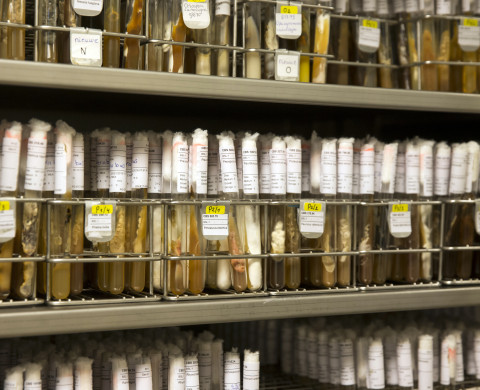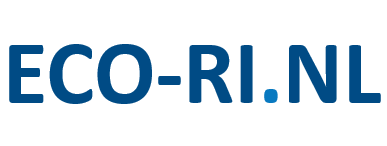CBS-KNAW collections and databases

Details
- Infrastructure type
- Collections - cultures / museum
- Institute
The facility
The CBS-KNAW culture collection from the Westerdijk Fungal Biodiversity Institute (WI-KNAW) is the largest in the world with more than 100.000 strains of fungi (including yeasts) and bacteria (including wild-type and mutant strains), hosts suitable for DNA research, genetically engineered plasmids, broad-host-range plasmids and phages. Expert scientists of the Westerdijk Institute, the collection curators and a group of technicians fully dedicated to the preservation and supply services provided by the Biological Resource Centres (BRC), guarantee the quality of the strains and services in compliance with all relevant regulations concerning biosafety and biosecurity.
There are three public collections:
-
CBS Fungal & yeasts collection
-
NCCB Bacteria collection
-
NCCB Plasmids and phages collections
The strains are preserved by cryopreservation and freeze-drying using state-of-the-art equipment. Strains are supplied to researchers in academic and other public institutes and companies around the globe for education, research and development. Scientific and other data associated with the strains (including DNA barcode sequences of all strains) are maintained in databases and available online. Via the online database, catalogues can be searched and orders for strains or their DNA can be placed. The CBS-KNAW Collections are ISO 9001 certified since 2007.
References
-
Crous, P.W., Verkley, G.J.M., Groenewald, J.Z., Houbraken, J. (Eds) (2019). Westerdijk Laboratory Manual Series 1: Fungal Biodiversity. 2nd Edition. Westerdijk Fungal Biodiversity Institute, Utrecht. 425 p.
-
Vu, D., Groenewald, M., de Vries, M., Gehrmann, T., Stielow, B., Eberhardt, U., Al-Hatmi A., Groenewald J.Z., Cardinali G., Houbraken J., Boekhout, T., Crous, P.W., Robert, V., Verkley, G.J.M. (2018) Large-scale generation and analyses of filamentous fungal DNA barcodes boosts coverage of the kingdom fungi and reveals thresholds for fungal species and higher taxon delimitation. Studies in Mycology 92: 135–154. DOI: https://doi.org/10.1016/j.simyco.2018.05.001.
-
Vu, D., Groenewald, M., Szöke, S., Cardinali, G., Eberhardt, U., Stielow, B., de Vries, M., Verkley G.J.M., Crous, P.W., Boekhout, T., Robert, V. (2016) DNA barcoding analysis of more than 9000 yeast isolates contributes to quantitative thresholds for yeast species and genera delimitation. Studies in Mycology (2016) DOI: https://doi.org/10.1016/j.simyco.2016.11.007.
-
Gamero, A., Quintilla, R., Groenewald, M., Alkema, W., Boekhout, T., Hazelwood, L. (2016) High-throughput screening of a large collection of non-conventional yeasts reveals their potential for aroma formation in in food fermentation. Food Microbiol. 60:147–159.
-
Verkley, G.J.M., Rossman, A., Crouch, J.A. (2015) The role of herbaria and culture collections. In The Mycota Volume VII, Systematics and Evolution Part B, 2nd edition (McLaughlin et al. eds), 205–225.
Running period
The CBS-KNAW collection is part of the long-term research at the Westerdijk Fungal Biodiversity Institute. The collection was founded in 1904 and has been continuously preserved and expanded. Today it is the largest public collection for living filamentous fungi and yeasts in the world. The NCCB Collection was established in 1998, when the unique Dutch collections of wild-type bacteria (LMD, Delft) and mutant bacteria, plasmids and phages (Phabagen, Utrecht) were brought together in WI-KNAW.
Equipment/facilities
State-of-the-art equipment is available for preservation and storage of microorganisms, including 16 liquid nitrogen cooled Taylor-Wharton 24K storage containers and two fully programmable freeze-dryers (Christ Epsilon 2-10D and 2-8D). Technical lab equipment necessary for microbiology, molecular biology and biochemistry is available. High-throughput sequencing facilities include Hamilton MicroLab Star robotics and a Sanger sequencer (AB 3730xl). ML-I and ML-II facilities are licensed for the manipulation of genetically modified strains of i.a. A. oryzae. In a new building (opened in 2017) the cryobank, BSL-3 and BSL-2 labs, and labs for the fungal natural products activities that are fully equipped for analytical chemistry (fume hoods, rotary evaporator, HPLC) are situated.
Data management
All data on the collections are stored in BioloMICS. Strains and associated data obtained from depositors is kept confidential until publication. WI also continuously adds new data to strain records, i.a., DNA sequences of barcode and other loci, and other analytical data. These data are released for viewing by internet users after validation and publication. Internet users thus are provided access to a wealth of scientific and other data associated with the strains in the collections. Use of such data is allowed under the conditions that the source (Westerdijk Fungal Biodiversity Institute, Utrecht the Netherlands) is duly acknowledged.
Available datasets
MycoBank (https://www.mycobank.org/), for fungal nomenclature (including formal registration of novel names and typifications), taxonomic descriptions including images and other information on all taxa of fungi.
Furthermore, various datasets can be freely accessed through the WI-KNAW website (https://www.wi.knaw.nl/), such as:
-
CBS and NCCB catalogues of public strains
-
Media for fungi and bacteria
-
Bacterial taxonomy
-
Several databases for reference and identification of specific fungal groups
Condition for access
Various databases are freely accessible. Use of such data is allowed under the conditions that the source (Westerdijk Fungal Biodiversity Institute, Utrecht the Netherlands) is duly acknowledged.
Strains or genomic DNA can be ordered by any party entitled, and will be delivered under the conditions of a Material Transfer Agreement (MTA). Supply of cultures may depend on certain conditions for biosafety and is against payment, but depositing strains in the public collection is free of charge. WI-KNAW cannot supply to private persons, and has to comply with national and international law and regulations for biosafety and biosecurity (export control), plant health and Nagoya protocol on Access and benefit Sharing. Recipients of cultures are required to assure they comply with all local regulations. For more information the WI sales staff should be contacted.
Contact
https://wi.knaw.nl/page/Public_deposits
More about the facility
https://wi.knaw.nl/page/Collection
Details
- Infrastructure type
- Collections - cultures / museum
- Institute

